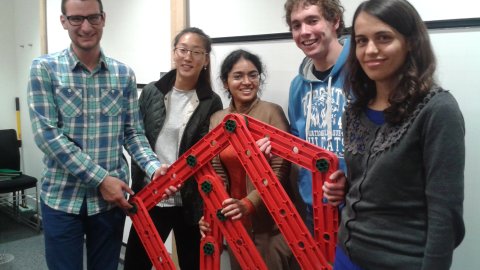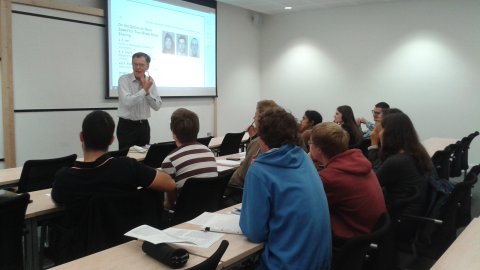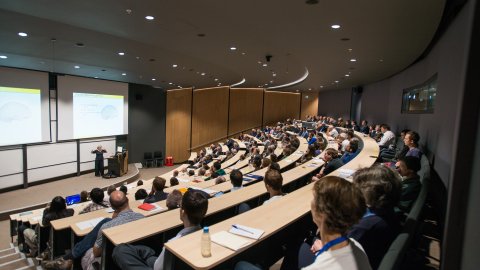Carleman Estimates and Unique Continuation for Fractional Schroedinger Equations
Abstract
equations and discuss how these imply the strong unique continuation
principle even in the presence of rough potentials. Moreover, I show how
they can be used to derive quantitative unique continuation results in
the setting of compact manifolds. These quantitative estimates can then
be exploited to deduce upper bounds on the Hausdorff dimension of nodal
domains (of eigenfunctions to the investigated Dirichlet-to-Neumann maps).
Global existence of solutions of the Ericksen-Leslie system for the Oseen-Frank model
Abstract
The dynamic flow of liquid crystals is described by the Ericksen-Leslie system. The Ericksen-Leslie system is a system of the Navier-Stokes equations coupled with the gradient flow for the Oseen-Frank model, which generalizes the heat flow for harmonic maps into the $2$-sphere. In this talk, we will outline a proof of global existence of solutions of the Ericksen-Leslie system for a general Oseen-Frank model in 2D.
Kinetic formulation for vortex vector fields
Abstract
We will focus on vortex gradient fields of unit-length. The associated stream function solves the eikonal equation, more precisely it is the distance function to a point. We will prove a kinetic formulation characterizing such vector fields in any dimension.
Sobolev inequalities in arbitrary domains
Abstract
A theory of Sobolev inequalities in arbitrary open sets in $R^n$ is offered. Boundary regularity of domains is replaced with information on boundary traces of trial functions and of their derivatives up to some explicit minimal order. The relevant Sobolev inequalities involve constants independent of the geometry of the domain, and exhibit the same critical exponents as in the classical inequalities on regular domains. Our approach relies upon new representation formulas for Sobolev functions, and on ensuing pointwise estimates which hold in any open set. This is a joint work with V. Maz'ya.
Commuting probabilities of finite groups
Abstract
The commuting probability of a finite group is defined to be the probability that two randomly chosen group elements commute. Not all rationals between 0 and 1 occur as commuting probabilities. In fact Keith Joseph conjectured in 1977 that all limit points of the set of commuting probabilities are rational, and moreover that these limit points can only be approached from above. In this talk we'll discuss a structure theorem for commuting probabilities which roughly asserts that commuting probabilities are nearly Egyptian fractions of bounded complexity. Joseph's conjectures are corollaries.
Non-commutative topology and K-theory for applications to topological insulators
Abstract
I will recall basic notions of operator K-theory as a non-commutative (C*-algebra) generalisation of topological K-theory. Twisted crossed products will be introduced as generalisations of group C*-algebras, and a model of Karoubi's K-theory, which makes sense for super-algebras, will be sketched. The motivation comes from physics, through the study of quantum mechanical symmetries, charged free quantum fields, and topological insulators. The relevant theorems, which are interesting in their own right but scattered in the literature, will be consolidated.




